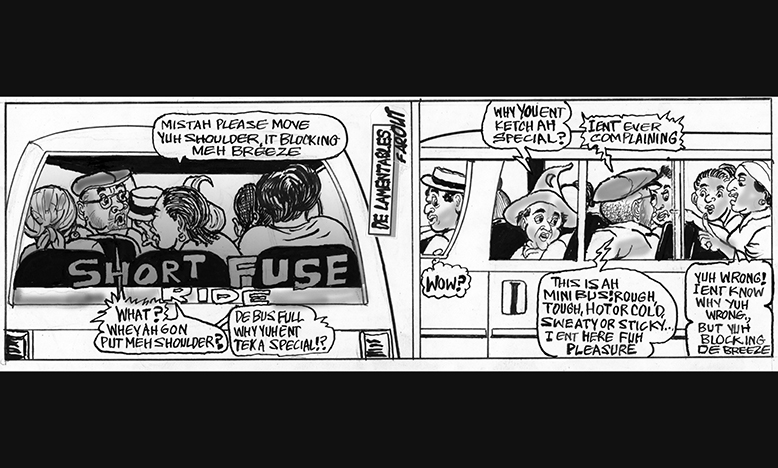WE can’t pretend that it isn’t real; that we aren’t in the age of the short fuse, much like the quick shake of ‘St. Vitus’ Dance’, the fabled medical condition, Sydenham’s chorea, that is largely responsible for the involuntary quivering of the body among its many other manifestations.
Except that in this case, the term is loosely used to define the instant hostile response to any illogical assertion or perceived act of transgression, be it in the home or the public domain.
For example, just recently, a citizen entered a minibus en route to the hospital. The bus was packed, but as it began to travel, another person from the extreme rear seat leaned over and told him, “Move your shoulder from the window, so I can get some breeze.” It was an unusual request, because the citizen is some 6’ 2” in height, and the bus seat is often uncomfortable for taller and bigger-by-mass persons. Still, the discomfort is endured, because it makes practical sense. Unfortunately, the request was met with hostility, because it was interpreted as being unreasonable. An argument that included others directed against the citizen occurred along opposing gender lines. In retrospect, the request should have been ignored, because it was not realistic to comply with, but in ignoring it, would the issue have been solved?
What cannot be ignored is what is occurring daily: A sudden action, most times vocal, directed from another’s interest without examining how practical it is, results in, most times, a mini outburst.
A case in point is standing in the bank for over an hour, then, as the line edges towards your turn, two people step before you, as if from nowhere, claiming that they were there before you, and the one person ahead affirms that they were. This line privilege, though irritable, is not seriously contentious; it is a “Guyana t’ing”. However, the reality of contentions that result in serious altercations is now commanding a special place in our social reality, especially at the family or believed-to-be friend level.
 How we were groomed from childhood, as well as the dictates of economic, societal changes with difficulty to comply with, bears on how we respond to things in the course of our day. The moods we portray on the surface are many times rooted in the internal self-reasoning on the conflicts of self-progress and the active confrontations with bills, family or the entitled attitude of diverse strangers that we will engage or be engaged by.
How we were groomed from childhood, as well as the dictates of economic, societal changes with difficulty to comply with, bears on how we respond to things in the course of our day. The moods we portray on the surface are many times rooted in the internal self-reasoning on the conflicts of self-progress and the active confrontations with bills, family or the entitled attitude of diverse strangers that we will engage or be engaged by.
ATTITUDINAL GOBLINS
One of the “attitudinal goblins” we carry around may very well be based on the advice we got at eight or nine years old. For example, I was told, “If a bully try fuh tek yuh thing, is best fuh fight he every time; if yuh don’t, yuh gon be everybody eye-pass all yuh life.” The strong lesson with the school bully encompassed two facts: That (a), the bully cannot be reasoned with, and (b) he or she has to be physically and mentally defied. But then, the bully is not always a physical manifestation; it is also based on the subtleties of irrationally imposed entitlement. But a third fact should have been added: Resist, but never become the bully.
The foregoing piece of advice, deemed so necessary at that crucial moment in a child’s life, can well become a limited interpretation within one’s individual cultural being, if not expanded through discussions that avoid collective stereotypes, but deal with individual social situations that can rationalise why the bully exists, and exists at different levels. For, as we grow older, the issues that constitute the whole diverse character of the bully slowly become obvious and better understood. But it does not change the fact that the bully will remain a reality of defiance and conflict, in the absence of friendly exchange and respectful agreement.
Recently, a relative confided in me about a situation where someone we know was subject to depression, then was thought to be possessed (Yes, by spirits!) because the individual started to tell him that they were hearing voices telling him to do very strange things.
Turns out that the anti-depressant tablets that some friend advised him to take were not prescribed, but bought from a ‘shady’ drugstore. After doing a bit of research, I told him that my son was always in trouble because of the advice he obtained via the Internet and his friends. My son has an addiction problem; his main problem is not admitting that he does not know when to stop talking, or being driven by his ego, and complying with expert advice, and that most of his friends similarly also feel that their ego would lose points to say, “Bro, I ain’t know nothing about dem things,” while others will callously sell poison to whoever they could convince.
The “magic” of tablets has transcended the simple age of Whizz and Phensic, supposedly all-purpose tablets that were popular in my childhood days. And it seems that, invariably, some tablets are designed to impact severe consequences on users. Which brings us to the question: Is the age of the “Short Fuse” also driven by mental conditions, and so-called medications?




.png)









